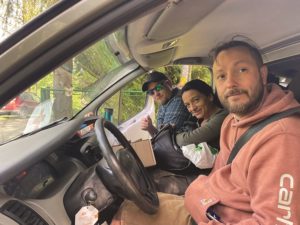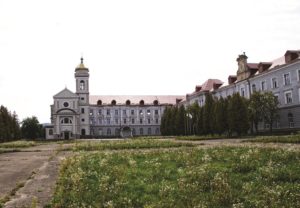My family is in Poland, so in August I traveled from Wellfleet to Cracow and then to my hometown of Gliwice to visit them and reconnect with old friends. Families get government vouchers to travel with their children in Poland, so I decided to use mine to take my daughter, Malina, to Bieszczady, in the eastern countryside close to the Ukrainian border.
It is in a region of beautiful green hills, and things were considerably more stable in Ukraine a few months ago than they are now. Recalling our visit, I remember the peace of the place. And when I read about rockets and drones flying across these areas that were once considered safe, I feel a sense of hopelessness that this war will never end.
Feeling more optimistic then, I wanted Malina to see this special place and meet friends who live near there, Filip and Agnieszka Pasek and their four children. They have a blacksmith shop in Mokre. They have also been working since the beginning of the war to create a long-term support system for refugees.
I arrived harboring some feelings of guilt. They were doing so much. What had we really done in Wellfleet other than make art and raise funds for the Polish Center for International Aid? Why had we not come sooner, not to see the beauty of the place, but to help?

Filip’s response made me rethink all that. He told me that the impulse to travel overseas to get involved directly does not necessarily lead to the best kind of help.
Filip works with SLOT, Stowarzyszenie Lokalnych Ośrodków Twórczych, which translates as the association of local creative centers, an organization I have been involved with for over 20 years. I used to think of it merely as a group of friends who put together a summer art festival that attracts 1,000 volunteers and hosts 5,000 participants at an abandoned monastery in Lubiąż, close to Wrocław.
Since the war began, a new project, SLOT on the Border has mobilized its grassroots volunteer network to help Ukrainians. Filip is the organization’s border project coordinator, managing logistics, transportation, and aid. Traveling back and forth between Poland and Ukraine, he has had an up-close view of the humanitarian crisis at the border and the chance to meet those who have come to help.
When people come from far-away places for a week or two or three, Filip tells me, they bring a desire to do something meaningful. They expect to see the effects of their work. They want to see refugees, talk to them, take their photos, and observe their reactions to being helped. In other words, they come with a need. “They want to touch the refugee,” as Filip put it.
They also typically expect organized work, which in times of war and chaos is not always possible. It takes effort to explain to volunteers how seemingly disconnected acts do help.
“When a volunteer sees someone going with a few bags of food to Ukraine, they want to be part of that experience,” Filip said, “rather than, say, cleaning a warehouse that could provide 100 or more bags of food to a bigger group of people. The problem is people want to help on their own terms.”
Not always, of course. Filip also told me about a group of American volunteers SLOT sent to a shopping mall turned refugee center. The group cleaned rooms and bathrooms, making the whole place work better.
Filip worries, too, about the efficacy of sending help in the form of cargo from overseas. He’s learned that it costs about $10,000 to send a shipping container from the U.S. to Ukraine. And that doesn’t include trucking the goods after they’ve arrived. Such deliveries require the work of many volunteers to sort and distribute donations. Truckloads of donated goods often stand for days on the border, and their cargo is sometimes lost to thieves or corruption.
Expensive or hard-to-get medical supplies are perhaps the only things worth shipping from overseas, Filip says. When it comes to food and clothing, it’s much better to send money to a local organization that can purchase products from local vendors more cheaply. SLOT, for example, can be more responsive to the situation on the ground. “One week ago, we needed space heaters,” he said. “Now we are buying gas masks.”
With a storage facility close to the border, SLOT stocks up on supplies and transports them into Ukraine through a trusted network of Ukrainian organizations, especially church groups, which tend to be experienced and less prone to corruption.

Now that winter is coming, Filip’s group is focusing on setting up a safe, warm place where displaced Ukrainians can stay — an initiative that is increasingly relevant considering the recent attacks by Russian forces on energy infrastructure.
Filip showed me a building SLOT is hoping to rent for refugees. It was once a luxurious vacation hotel in a former palace on the Ukrainian side of the border, only a 20-minute drive from Poland.
“It can house 1,300 people, and now it is empty,” said Filip. It is the kind of place most needed by Ukrainians who lack the resources to cross the border and elderly people who can’t stay in houses without power in the winter but don’t want to travel far from home.
Having a place will help volunteers put their “SLOT hospitality” values into action. They plan to focus on giving refugees meaningful activities and work, things Filip said will help them “rebuild their independence, agency, and sense of meaning.”
It can be overwhelming to absorb the news about everything that’s going wrong in the world right now. But I came back from this trip with stronger convictions about how to help.
We don’t need to travel to the front lines to make a difference. We can choose a cause close to our hearts as Filip has done and seek out trusted organizations to support. It is worth remembering that systems made up of small steps can add up.
For people on the other side of the globe, our giving can be life-changing, even if we don’t ever witness the joy it brings.



